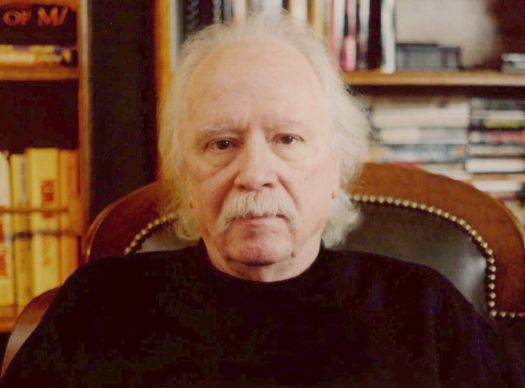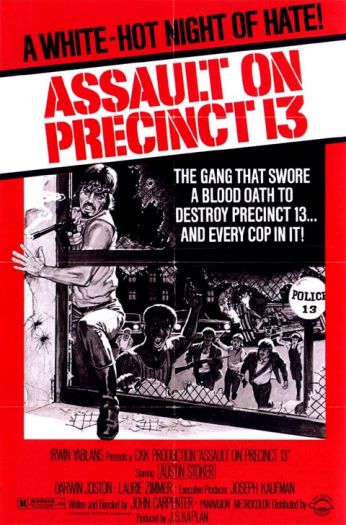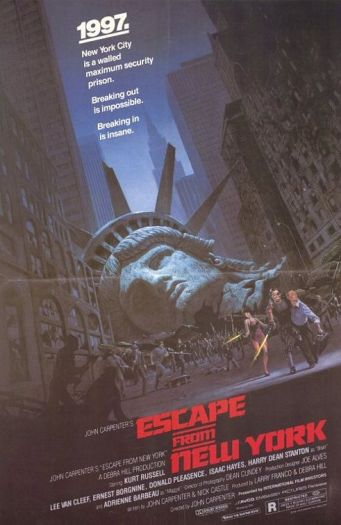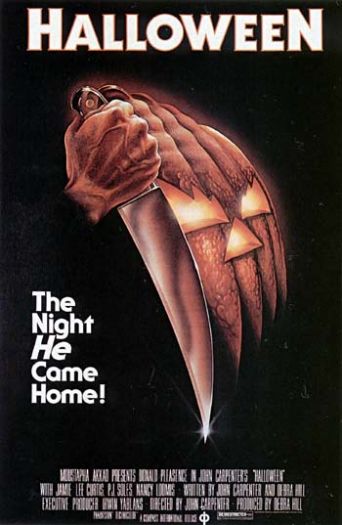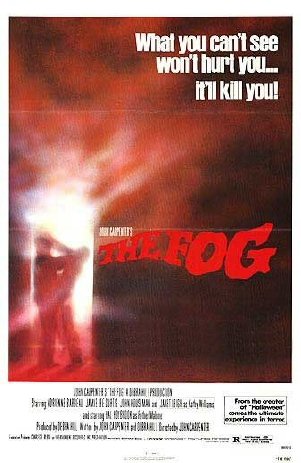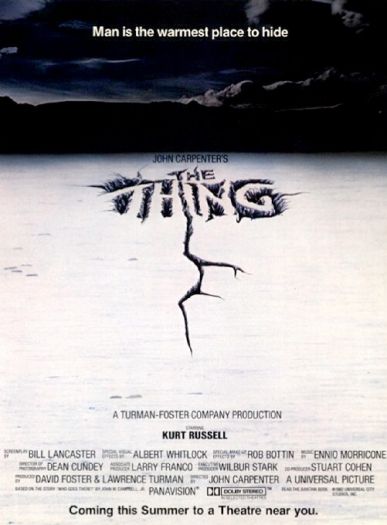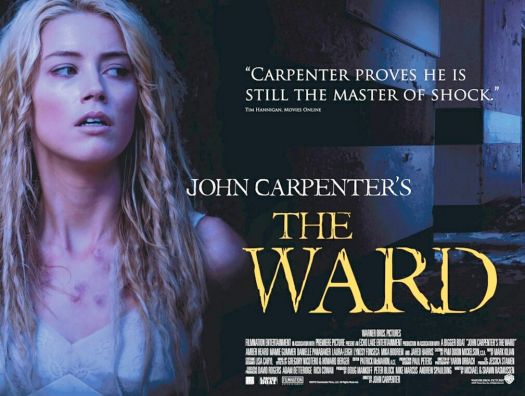|
From HouseofHorrors.com Interviews
Director Interview: John Carpenter by Jonathan StrykerBorn in Carthage, NY in 1948 and raised in Bowling Green, Kentucky, film director John Carpenter started his career as a teenager by shooting 8mm films with his father's movie camera. In 1968 his lifelong love of film landed him at University of Southern California in Los Angeles where he met fellow filmmakers Dan O'Bannon (writer of ALIEN, BLUE THUNDER and LIFEFORCE) and Nick Castle (director of THE LAST STARFIGHTER). After co-writing, co-directing and editing the Oscar-winning Best Live-Action Short Subject THE RESURRECTION OF BRONCO BILLY, he made his thesis project, a 45-minute science fiction parody of 2001: A SPACE ODYSSEY called DARK STAR with O'Bannon, which was expanded to feature-length and given a theatrical release. His second film, the cult hit ASSAULT ON PRECINCT 13, was shot in 20 days on a budget of less than $125,000 and boasted a brilliant and sinister minimalist score by the director. It succeeded in Europe and secured him THE BABYSITTER MURDERS, an idea suggested to him by film producer Irwin Yablans who was impressed with PRECINCT 13. Setting the story on Halloween night and creating a mystique about the film's murderer, Michael Myers, proved pivotal to HALLOWEEN's box office success. The film spawned one of the most lucrative franchises in cinema history while effectively securing Mr. Carpenter a two-picture deal with AVCO-Embassy Films, out of which came THE FOG and ESCAPE FROM NEW YORK, both of which also boasted original scores by Mr. Carpenter.
Ennio Morricone, Jack Nitzsche and Shirley Walker took over scoring duties on THE THING, STARMAN and MEMOIRS OF AN INVISIBLE MAN respectively, but Mr. Carpenter took back the reins on CHRISTINE, BIG TROUBLE IN LITTLE CHINA, PRINCE OF DARKNESS, THEY LIVE, BODY BAGS, IN THE MOUTH OF MADNESS, VILLAGE OF THE DAMNED, ESCAPE FROM LA, VAMPIRES, and GHOSTS OF MARS. Unfortunately, he no longer scores his own films, as it is too time consuming and too much work. With the exception of DARK STAR, his TV-movies HIGH RISE and ELVIS: THE MOVIE (incredibly, Elvis Presley plays "Dr. John Carpenter" in the 1969 movie CHANGE OF HABIT), and his additional television work, Mr. Carpenter has photographed all of his films in the anamorphic 2.35:1 aspect ratio, which yields a wider, panoramic image on the movie screen, something retained for the DVD releases of his films. I spoke to Mr. Carpenter regarding his career and his new film, THE WARD, which was filmed in 2009 in the Des Moines, Medical Lake, Cheney, and Spokane areas of Washington State and which is now available on DVD and Blu-ray.
Jonathan Stryker: You made several short films on 8mm when you were a teenager, with titles as diverse as REVENGE OF THE COLOSSAL BEASTS, TERROR FROM SPACE, GORGO VS. GODZILLA, GORGON THE SPACE MONSTER, WARRIOR AND THE DEMON, and SORCEROR FROM OUTER SPACE. Will audiences ever get a chance to see these films? John Carpenter: Never, never, ever. Jonathan Stryker: Really? Not even as a supplement on a DVD? John Carpenter: Never. Jonathan Stryker: Because? John Carpenter: Because they're shit. Jonathan Stryker: (Laughs and mockingly pleads) Not even your die-hard fans who are curious and really would love to see them? John Carpenter: I don't care how curious you are. You can be curious. You can be curious about seeing me naked, but you're not going to. There are some things I will not do, and I will not show those films. Jonathan Stryker: What did making those short films teach you about filmmaking? John Carpenter: My dad had an 8mm movie camera, and he gave it to me as he got bored. He wanted to do stills. So, I had an 8mm movie camera, I had a splicer with splicing cement so I could cut them together, and I had a titler. What I used to do when I started was called in-camera editing. So, I would have an actor run up and look, and I would shoot what he saw, then stop the camera and then shoot his reaction. Jonathan Stryker: All done in-camera. John Carpenter: Right. And then one day it suddenly occurred to me that what I could do, I could shoot the actor and let him do all his acting, and then at another time and even in another location, I could shoot what he's looking at. So, I discovered the essence of filmmaking, the basic cut, from one thing to another. It's the simplest thing, and everyone takes it for granted nowadays, but nobody taught me that. Jonathan Stryker: What is your favorite film of the ones you have directed? John Carpenter: I don't have any personal favorites. I have ones that I like more than others, that I think are more successful than others, dramatically speaking. I think THE THING is pretty successful dramatically. But, no, they're all my favorites. Jonathan Stryker: Do you watch your films? John Carpenter: No, I never want to see them again. Jonathan Stryker: When you see your films, are you able to get lost in the story? John Carpenter: I look at them from an audience point-of-view when I watch my own films and see how they're pacing out, if they're going to carry an audience or not. It's changed over the years. It's gotten faster and faster so you can get more and more information going. But no, I don't get lost in them. Jonathan Stryker: Do you storyboard? John Carpenter: Not so much anymore. I used to, but when you're doing an effects movie you have to draw them out so that everyone can talk about what the shot is. So, you storyboard the effects sequence to see this angle, or that angle. I started doing my own storyboards on ASSAULT ON PRECINCT 13, then after that ESCAPE FROM NEW YORK we storyboarded.
Jonathan Stryker: You've written some terrific scores for your films. I remember loving the HALLOWEEN theme the first time I heard it. Does the music come to you while you're shooting, or during post-production? John Carpenter: It comes to me as I'm composing. I improvise it all. It's all done after the movie's shot. I wouldn't think about it. I'm there to support what I see on the screen. I can't do it anymore, though. It's too much work. I've given up the music. Now, all these genius, young composers can do it better than I can.
Jonathan Stryker: How would you compare making films in the 2010's to the 1970's when you started your career? John Carpenter: Filmmaking has not changed at all, essentially. You have a crew of people, you have the actors, and you're on a location or on a set, interior or exterior, night or day. You come in, get a rehearsal, rehearse for the camera, set the camera where it's going to be, light it, shoot it, then shoot the reverses - all that's pretty much the same, and that process has not changed. Everything around it has. The technology - the editing process - has changed enormously with computers. The business aspect of it - the commerce - has changed enormously. The essence of it hasn't. Actors need to know their lines and come in and be ready to go, and of course, most of them don't. They want to change everything, and that's gotten worse. It's unbelievable. They don't want to say what they've agreed to; they want to say something different. Jonathan Stryker: Do they look to change the dialog? John Carpenter: They re-write the scenes, sometimes incoherently. Younger actors expect to sit with the director in the editing room. They expect it. They expect to dictate certain cuts. It's up to the director and it depends upon how you handle it. It has to be dealt with. I've never shown dailies to actors. But, apparently it's a brand new world. It's really shocking. You have people who are not particularly big stars but they want their own pass at the editing process. Now, I personally have never experienced that much before, but I have sat down with an actor, and they say, "I don't like that in the scene, can we see what else you have?" It's unbelievable. Jonathan Stryker: Your films have some very memorable and atmospheric poster artwork. How involved are you in the conception process? John Carpenter: (Holds thumb and forefinger together and peers through circle with one eye) Zero! Zero. They used to bring me in and have me look at a bunch of posters: "Oh, look at that one! That one looks interesting." But, not anymore, now they just say, "Here." Jonathan Stryker: The posters are all made on computer now? John Carpenter: I have no clue. The first poster that they came up with for THE FOG was one I didn't like. I said, "Can we do better than that?"
Jonathan Stryker: Your films have very stylish openings: the use of the pumpkin in HALLOWEEN, the credits slowly playing through the opening of THE FOG and through the first ten minutes of PRINCE OF DARKNESS, etc. How do these sequences come about? John Carpenter: Instinct. For the pumpkin [in the opening to HALLOWEEN], we did that because it was cheap, and we shot that the same day that we shot the interior of the car with Donald Pleasance. It was all necessity.
Jonathan Stryker: THE THING is rightly considered to be one of the best horror films of all-time. Why do you feel that it was so poorly received at the time it was released? John Carpenter: Hated by the fans. Hated. It was a depressing film with an uncertain ending in the middle of a depression [in 1982] when it came out two weeks after E.T. I don't think it was a summer movie. I think they should have put it out in the fall. And the fans hated, hated, hated it. They had thought that I had raped a national treasure when comparing it to the original. "Look at how he soiled the nest!" I'm serious. Jonathan Stryker: Are you amazed by the turn-around people have made on this film? John Carpenter: I haven't experienced a complete turn-around, all I know is there are a lot of people who like it now. Jonathan Stryker: What movies have you seen that, the first time you saw them you didn't like them, but upon seeing them again you really liked them? John Carpenter: Oh, that's interesting. The first movie I saw like that was TAXI DRIVER. I remember thinking, I don't know about this film. Then I saw it again, and experienced it differently. I remember THE SHINING. I thought, This is a piece of trash. Then I saw it again and thought, Oh, it's funny! How funny Jack Nicholson is. There are a lot of movies like that, and there were some that I was harsher on when I was younger. When you're younger, you're very pretentious and very serious. Now I see them again and I think, Wow, that's pretty damned good! What's wrong with me? Jonathan Stryker: What film of yours is closest to your original vision? John Carpenter: Probably the films with the lowest budgets because there's no opportunity for changing anything. They have to be what you've written. HALLOWEEN was almost exactly what was written. Jonathan Stryker: What are your feelings about the Internet? John Carpenter: The Internet is very interesting. It's become a real tool in some ways, hasn't it? THE BLAIR WITCH PROJECT - people got really stirred up about it. The whole Internet thing is fascinating to me. My son lives in Japan and I email him. That was the reason I started going online, it was to do email. I'm also a gamer, so I find all kinds of video game cheats on there. Plus, I'm a basketball addict, so I can look up the NBA and see what's going on. Jonathan Stryker: Your new film is THE WARD starring Amber Heard. What brought you back to directing a feature after so many years? John Carpenter: Well, I hadn't directed a movie in a long time, except for the "Masters of Horror" television stuff. The script came along which was perfect because it was a lower-budget film that took place in kind of a limited location. There were some really good acting parts in it. I thought that it would be fun to kind of put my foot back in the water, just to check it out and see how I liked it. That was really the draw, you know? (pauses) It's hard making movies. It is. You get to a certain age and it's just harder.
Jonathan Stryker: I recall you talking about your first 24-hour shoot on ASSAULT ON PRECINCT 13 and at the end of it you felt like you had been beaten up. John Carpenter: Oh, God, yeah. Twenty-four hours. In a jail cell. Of course, they had real bars, and the problem is you can't light it and frame it. You have to have bars that are wider. It was staggering. And then I did this TV-movie, ELVIS, which was almost three hours, and we had thirty days to shoot it, so we had to do an hour of film in ten days. I literally, in that movie - I remember the dailies and Kurt Russell was playing Elvis in his triumphant return. When the film aired I just fell asleep - I was just too tired. (chuckles) Nobody feels sorry for me. I can whine all I want - I love whining - and nobody feels sorry for me! Jonathan Stryker: Well, thank you for whining for me! John Carpenter: (chuckles) Hey, man, thank you! © Copyright by HouseofHorrors.com |
